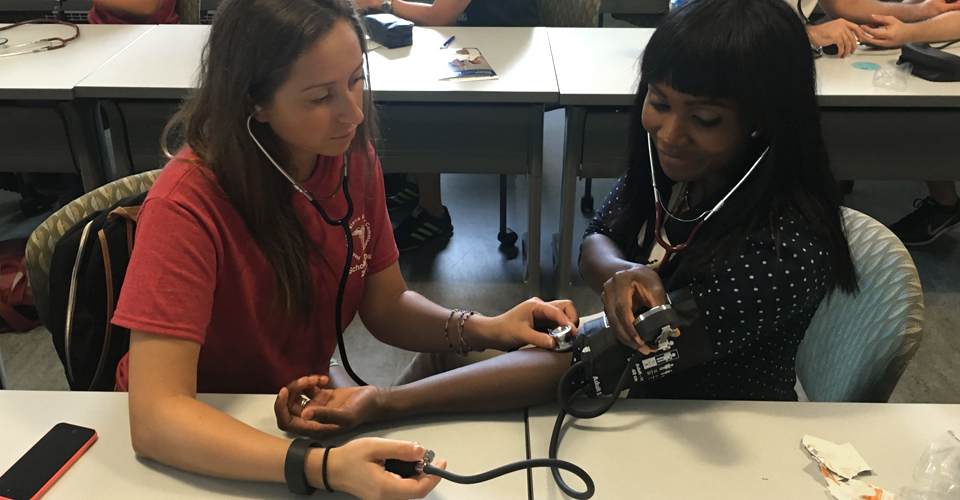Three awards from the Healthcare Access initiative of the Ohio Medicaid Technical Assistance and Policy Program (MEDTAPP) will make it possible for Northeast Ohio Medical University to continue growing its community health care initiatives in Northeast Ohio. Funding will be used to integrate mental health and addictions treatment into primary care and to train community health workers and future teachers to increase healthcare access to the underserved in Portage and the surrounding counties.
Community Health Workers
John Boltri, M.D., chair and professor of family and community medicine and Gina Weisblat, Ph.D., assistant professor of family and community, received grants of $677,289 and $198,818, respectively. Each of the grants will provide community health worker (CHW) training to preservice teachers and community members in underserved areas.
A CHW is a lay person trained to extend the reach of primary care physicians, who are in short supply. Training to become a CHW includes 120 didactic hours and 130 practicum hours during which the CHW is working in the community. Certification from the Ohio Board of Nursing requires that individuals be at least 18 years old, have a GED or high school diploma, meet the required hours described above, pass a background check and be certified in CPR.
From the Community, for the Community
The CHW program trains lay people from the community to provide health care access to its own underserved populations, such as the Nepalese refugee population in Akron. Each year, classes are held at locations that are most convenient for class participants. One year, Akron classes were held at the city’s International Institute, located in the North Hill area where a Nepalese refugee population has settled. In the first two years of the program, training participants included NEOMED AmeriCorps members, interpreters who worked at Akron Children’s Hospital, and health workers at AxessPointe, a Federally Qualified Health Center.
Because any community members over the age of 18 can attend the training, “It makes for interesting discussions,” said Terence Kline, D.V.M., assistant professor of family and community medicine and program administrator of the MEDTAPP grant. “Classes can have 18- year-olds and 60–year-olds in the same class, bringing a variety of experience to the table.”
Community interest was high for the first two years of the program, and Dr. Kline expects that the number of people trained this year will again exceed the requirement as more people become advocates for their community.
Preservice Teacher Training
Dr. Weisblat said that preservice teacher training through the Cleveland State University College of Education will provide opportunities for future teachers (trained by mentor teachers) to learn how to integrate health and wellness into the curriculum in public school classrooms across the greater Cleveland area. Dr. Weisblat said that nationally, this program is groundbreaking in its approach of training teachers to cover health and wellness topics as they relate to other class subjects instead of isolating them. Teachers will also serve as secondary resources to the students for support and direction.
“This program and pilot effort are critical to shifting the current paradigm we have for helping students take a higher level of responsibility for their health and the health of their community,’’ said Dr. Weisblat.
Additional plans are being made to train CHWs and master trainers who can spread the training to other sites.
Department of Psychiatry
The NEOMED department of psychiatry received a $1.3 million Medicaid Technical Assistance and Policy Program Healthcare Access Initiative (MEDTAPP HCA) renewal grant to support innovative teaching and training programs meant to increase the number of healthcare providers who serve those insured by Ohio Medicaid and to better prepare the workforce to meet the complex needs of this population.
The department of psychiatry and its community-based collaborators will continue to provide teaching, consultation and training activities for undergraduate and graduate students, residents and fellows from psychiatry, primary care, pharmacy, nursing, social work, counseling, psychology and other disciplines—as well as for the professionals who teach and mentor them.
“Many of the MEDTAPP-HCA-related activities focus on increasing learners’ knowledge and skills as they pertain to integrated mental health, addiction and primary care and community psychiatry. Learners will focus on specific practices including cognitive behavioral therapy, motivational interviewing, family-based services and pharmacotherapy for schizophrenia,” said Mark R. Munetz, M.D., The Margaret Clark Morgan Endowed Chair in Psychiatry and principal investigator for the department of psychiatry’s MEDTAPP HCA grant.
Dr. Munetz added, “The NEOMED department of psychiatry is refining its undergraduate medical psychiatry curriculum and developing approaches to training in integrated health care settings through a regional cross-collaboration with support from this grant.”
About MEDTAPP
MEDTAPP is designed to recruit and retain individuals in the health care professions by providing training in interprofessional education, behavioral health, community health worker skills and community-based experiences—all to help serve people enrolled in Medicaid. The MEDTAPP Healthcare Access Initiative was started in 2012 to train and place providers in behavioral health, primary care, geriatrics and advanced practice nursing. It is a partnership among Ohio Medicaid, the Ohio Department of Mental Health and Addiction Services, the Ohio Department of the Health, Ohio Board of Regents and Ohio's colleges and universities.
